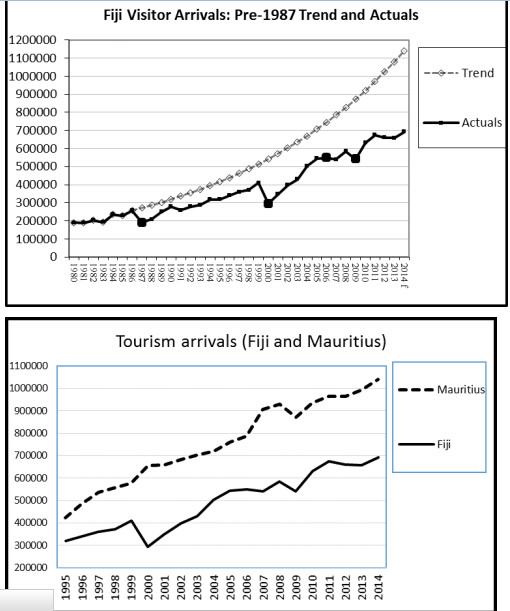
Professor Wadan Narsey
GOVERNMENTS are usually elected and their performances judged by ordinary voters for their policies on education, health, poverty alleviation, and taxes- whose effects are easily visible and felt.
Few think about a government’s performance in creating new self-sustaining industries which can generate good jobs and incomes, leading to genuine economic development in the long run.
Ask yourself: what new self-sustaining industries has any Fiji government created since 1970, entirely through its own effort?
The sugar industry has been here from colonial times, while tourism, gold, copra, and water exports, have all been initiated by private investors.
Only the mahogany industry was initiated by government, in colonial times, and Fiji is merely harvesting now (not even value adding).
Perhaps some investment has been encouraged through the reductions in taxes.
But what one sees, day after day, are ministers and civil servants reviving the “salusalu industry”, in their efforts to sustain industries which will never survive once the subsidies are ended.
Sadly, two new important industry opportunities have largely gone begging these last twenty years: call center and data processing, and retirement homes and aged care.
Boosting the salusalu industry
In Fiji, it is natural for ministers and permanent secretaries to be garlanded with salusalu, while lauding the performance of some industry and bestowing awards.
But which of the deserving winners in the annual tourism or the Exporter of the Year awards owe any part of their success to government efforts?
Indeed, how many are earned despite disincentives created by governments?
For example, while ministers frequently boast of “record visitor arrivals”, the reality is that visitor arrivals would have already reached a million, had it not been for the coups of 1987, 2000 and 2006.
See the two graphs, the first showing the moderate growth trend (dotted line) before the 1987 coup, and the actuals, with the black square dots showing the coups.
In case some claim that Fiji’s tourism suffered because of the Global Financial Crisis, the second graph shows a comparison with Mauritius, a small island nation in the middle of an ocean, whose economy is similar to Fiji’s, half the population are of Indian origin, and whose tourism arrivals have already reached one million).
But these few dozen are a drop in the ocean of six hundred thousand European seasonal workers already working in Australia, without any MOUs or “hoopla” by the European or Australian governments.
More importantly, thousands of Fijians have already been working abroad as nurses, care givers, security guards etc. sending home hundreds of millions of dollars in remittances, twice the value of our sugar industry. Again, without any government assistance.
Governments’ normal work?
The crux of the problem is that no minister or civil servant is ever charged with the task of initiating new industries, and to be rewarded if they do so.
Their normal work consists of attending meetings (preferably abroad), controlling the private sector, and every new government “re-invents some wheel” which had been created decades ago, and broken by previous governments.
One of the current tragedies is the marginalization of the National Planning Office, and the failure to formulate Development Plans which could chart the way forward for the economy, while learning from past mistakes.
For instance, Fiji’s early Development Plans wrongly subsidized inefficient import substitution industries which could not survive once the tariff protection or subsidies were removed.
The same wheels, such as in rice or dairy or exercise books, are being energetically reinvented today (with the usual accompanying salusalu), equally doomed to failure in the long run.
Successive Fiji governments refuse to learn the basic economics lesson that our growth strategy should focus on “comparative advantages”.
What are our resources that the world wants, and to which we must add value, creating jobs and incomes? (timber, fisheries, water, gold?).
What are Fiji people’s services which the world wants, with the potential of creating large numbers of jobs and decent incomes? Call and data processing centers and aged care or retirement homes industries.
The missing call center industry
In 1997, the Southern Cross Cable connected Fiji to North America, Australia and NZ and the world, making us an ideal location for a call center industry, potentially employing tens of thousands of highly paid workers.
Fiji is located at 180 degree longitude, an ideal time zone to serve the rest of the world when they are in darkness.
Fiji also has tens of thousands of school graduates whose spoken English is far superior to the millions who service call centers in Bangalore and other developing countries.
Tragically in 1999, the short-sighted SVT government created a super ATH monopoly (controlled by our own Fiji National Provident Fund), which chose to milk monopoly profits out of the telecommunications industry instead of encouraging new industries.
Read my two Fiji Times articles of more than ten years ago:
https://narseyonfiji.wordpress.com/2012/03/28/the-athl-monopoly-between-the-devil-and-the-deep-blue-sea-fiji-times-5-march-2002/
https://narseyonfiji.wordpress.com/2012/03/28/the-communication-monopoly-monsters-at-work-the-fiji-times-21-may-2004/
There are a few successful private initiatives, such as Quest and Mindpearl (read their website), and another about to be initiated by a shrewd executive recently associated with Fiji Airways.
FNPF fails to understand that a new industry of 20,000 workers, each earning around $20,000 per year, would not only generate incomes of $400 million per year, but FNPF itself would receive $72 million annually, a sum which would keep increasing, a great boon to FNPF’s future liquidity problems.
The retirement homes industry
Fiji workers are renowned for their great service mentality, and are going all over the world working as care givers.
Yet Fiji’s climate and latitude are ideal for a retirement homes industry, which can be extremely labor intensive, employing staff around the clock, and around the year, paying far more than the wages in the tourism industry.
Read my Fiji Times article some sixteen years ago:
https://narseyonfiji.wordpress.com/2012/03/29/jobs-and-the-elderly-a-niche-market-for-fijian-tourism-the-fiji-times-26-november-1999/
This potential industry has got nowhere because military coups have scared off major international investors (like the Australian multinational Prime), and because Fiji has failed to set up quality health services which elderly retirees from Australia, NZ, US, Canada and Japan, require as a minimum.
There are interesting (sick) stories about why Fiji authorities have put the brakes on Indian hospitals wanting to set up in Fiji, such as in association with Fiji National University.
But there are also other problems such as suitable land (duh), and total absolute security for the retirees (Fiji is not “crime free” as declared a few years ago with accompanying salusalu).
For private investors, it is much easier and more profitable to build tourism hotels housing temporary visitors, than take on the myriad headaches of looking after the elderly (most of whom do not drink too much alcohol either- a great source of profit).
Some churches (with whom I broached these possibilities some years ago) may well wake up one of these days out of their slumber and realize that they have the service mentality and suitable land to not just educate the children of their flocks, but also provide retirement homes for their elderly, easily marketed also to their flocks abroad as service providers to be trusted.
One Indo-Fijian community, Sangam, is apparently taking up the challenge and I have little doubt they will succeed not only with locals but Indo-Fijians abroad who would like to end their days in Fiji, amongst their own communities.
No doubt these industries will come eventually, and be announced by some Minister as “unprecedented in the history of Fiji”.
But hopefully, government will facilitate this growth on a large scale, and not just become free riders when the industry has succeeded by the private sector’s efforts, boosting the salusalu industry while claiming yet again, “the first government in the history of Fiji to do blah blah blah”.






